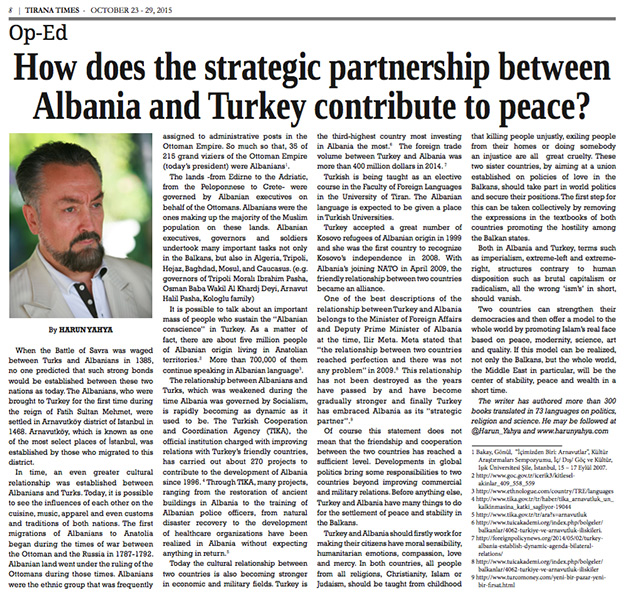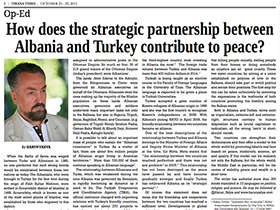
When the Battle of Savra was waged between Turks and Albanians in 1385, no one predicted that such strong bonds would be established between these two nations as today. The Albanians, who were brought to Turkey for the first time during the reign of Fatih Sultan Mehmet, were settled in Arnavutköy district of Istanbul in 1468. Arnavutköy, which is known as one of the most select places of İstanbul, was established by those who migrated to this district.
In time, an even greater cultural relationship was established between Albanians and Turks. Today, it is possible to see the influences of each other on the cuisine, music, apparel and even customs and traditions of both nations. The first migrations of Albanians to Anatolia began during the times of war between the Ottoman and the Russia in 1787-1792. Albanian land went under the ruling of the Ottomans during those times. Albanians were the ethnic group that was frequently assigned to administrative posts in the Ottoman Empire. So much so that, 35 of 215 grand viziers of the Ottoman Empire (today's Prime Minister) were Albanians.[i]
The lands -from Edirne to the Adriatic, from the Peloponnese to Crete- were governed by Albanian executives on behalf of the Ottomans. Albanians were the ones making up the majority of the Muslim population on these lands. Albanian executives, governors and soldiers undertook many important tasks not only in the Balkans, but also in Algeria, Tripoli, Hejaz, Baghdad, Mosul, and Caucasus. (e.g. governors of Tripoli Moralı İbrahim Pasha, Osman Baba Wakil Al Khardj Deyi, Arnavut Halil Pasha, Koloğlu family)
It is possible to talk about an important mass of people who sustain the "Albanian conscience" in Turkey. As a matter of fact, there are about five million people of Albanian origin living in Anatolian territories.[ii] More than 700,000 of them continue speaking in Albanian language[iii].
The relationship between Albanians and Turks, which was weakened during the time Albania was governed by Socialism, is rapidly becoming as dynamic as it used to be. The Turkish Cooperation and Coordination Agency (TİKA), the official institution charged with improving relations with Turkey's friendly countries, has carried out about 270 projects to contribute to the development of Albania since 1996.[iv] Through TIKA, many projects, ranging from the restoration of ancient buildings in Albania to the training of Albanian police officers, from natural disaster recovery to the development of healthcare organizations have been realized in Albania without expecting anything in return.[v]
Today the cultural relationship between two countries is also becoming stronger in economic and military fields. Turkey is the third-highest country most investing in Albania the most.[vi] The foreign trade volume between Turkey and Albania was more than 400 million dollars in 2014.[vii]
Turkish is being taught as an elective course in the Faculty of Foreign Languages in the University of Tiran. The Albanian language is expected to be given a place in Turkish Universities.
Turkey accepted a great number of Kosovo refugees of Albanian origin in 1999 and she was the first country to recognize Kosovo's independence in 2008. With Albania's joining NATO in April 2009, the friendly relationship between two countries became an alliance.
One of the best descriptions of the relationship between Turkey and Albania belongs to the Minister of Foreign Affairs and Deputy Prime Minister of Albania at the time, İlir Meta. Meta stated that "the relationship between two countries reached perfection and there was not any problem" in 2009.[viii] This relationship has not been destroyed as the years have passed by and have become gradually stronger and finally Turkey has embraced Albania as its "strategic partner".[ix]
Of course this statement does not mean that the friendship and cooperation between the two countries has reached a sufficient level. Developments in global politics bring some responsibilities to two countries beyond improving commercial and military relations. Before anything else, Turkey and Albania have many things to do for the settlement of peace and stability in the Balkans.
Turkey and Albania should firstly work for making their citizens have moral sensibility, humanitarian emotions, compassion, love and mercy. In both countries, all people from all religions, Christianity, Islam or Judaism, should be taught from childhood that killing people unjustly, exiling people from their homes or doing somebody an injustice are all great cruelty. These two sister countries, by aiming at a union established on policies of love in the Balkans, should take part in world politics and secure their positions. The first step for this can be taken collectively by removing the expressions in the textbooks of both countries promoting the hostility among the Balkan states.
Both in Albania and Turkey, terms such as imperialism, extreme-left and extreme-right, structures contrary to human disposition such as brutal capitalism or radicalism, all the wrong 'ism's' in short, should vanish.
Two countries can strengthen their democracies and then offer a model to the whole world by promoting Islam's real face based on peace, modernity, science, art and quality. If this model can be realized, not only the Balkans, but the whole world, the Middle East in particular, will be the center of stability, peace and wealth in a short time.
[i] Bakay, Gönül, “İçimizden Biri: Arnavutlar”, Kültür Araştırmaları Sempozyumu, İç/ Dış/ Göç ve Kültür, Işık Üniversitesi Şile, İstanbul, 15 – 17 Eylül 2007.
[ii] http://www.goc.gov.tr/icerik3/kitlesel-akinlar_409_558_559
[iii] http://www.ethnologue.com/country/TRE/languages
[iv] http://www.tika.gov.tr/tr/haber/tika_arnavutluk_un_kalkinmasina_katki_sagliyor-19044
[v] http://www.tika.gov.tr/tr/ara?s=arnavutluk
[vi] http://www.tuicakademi.org/index.php/bolgeler/balkanlar/4062-turkiye-ve-arnavutluk-iliskileri.
[vii] http://foreignpolicynews.org/2014/05/02/turkey-albania-establish-dynamic-agenda-bilateral-relations/
[viii] http://www.tuicakademi.org/index.php/bolgeler/balkanlar/4062-turkiye-ve-arnavutluk-iliskiler
[ix] http://www.turcomoney.com/yeni-bir-pazar-yeni-bir-firsat.html
Adnan Oktar's piece on Tirana Times


